May 18, 2025 | 02:12 GMT +7
May 18, 2025 | 02:12 GMT +7
Hotline: 0913.378.918
May 18, 2025 | 02:12 GMT +7
Hotline: 0913.378.918
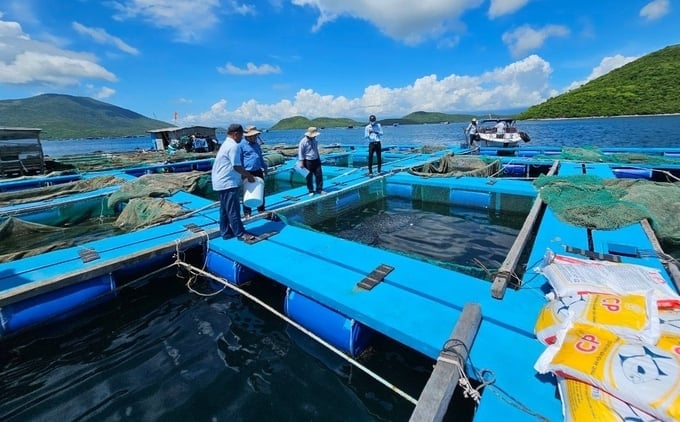
Cage aquaculture deployed by members of the Tourism Aquaculture Cooperative in Van Phong commune, Van Ninh District. Photo: KS.
Van Phong, located in Van Ninh District, Khanh Hoa Province, is a coastal deep-water bay. Its well-functioning dynamic flow system facilitates constant water exchange, self-cleaning, and minimal pollution.
Moreover, the expansive water surface and favorable environment make the commune an ideal location for mariculture development. Consequently, it has become a key mariculture area in Khanh Hoa province, with a focus on major species such as lobster and marine fish.
However, recent mariculture activities in Khanh Hoa province and Van Ninh district have been predominantly spontaneous. Moreover, local governments are unable to assign marine areas or entered into contracts for leasing marine areas to farmers. This poses a number of challenges in the issuance of cage aquaculture registration documents and impacts farmers' confidence in production.
The Tourism Aquaculture Cooperative in Van Phong, Van Ninh district, currently has 32 members with 4,000 cages for lobster and marine fish farming. Mr. Nguyen Thanh Sang, Chairman of the Board of Directors, stated that neither the cooperative nor the fish farmers in Van Phong Bay have been issued documents for cage aquaculture registration.
In response to the issue, the cooperative has submitted requests to the district's government and the local Department of Natural Resources and Environment, and Department of Economics to request assignment of mariculture areas. However, specialized agencies have attributed their inability to comply to a lack of authority. Consequently, Mr. Sang has suggested local governmental agencies to provide guidance and promptly assign mariculture areas to ensure farmers' confidence in aquaculture. Additionally, he recommended stakeholders to invest in technological solutions, such as transitioning from wooden cages to HDPE cages, to adapt to natural disasters.
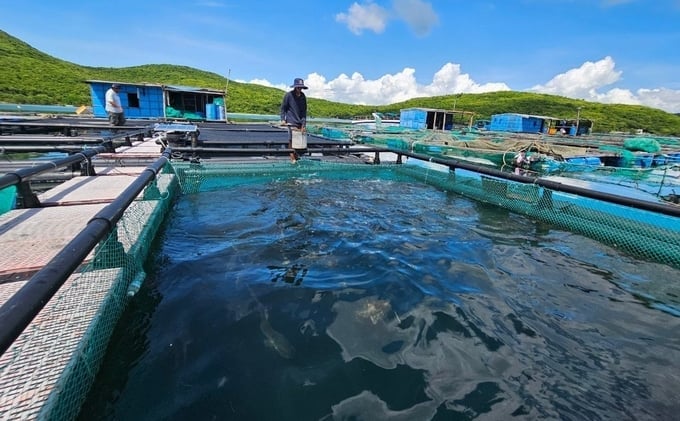
Aquaculture farmers anticipate the assignment of mariculture areas to engage in production with confidence. Photo: KS.
Mr. Nguyen Ngoc Vy, Head of Van Ninh district's Department of Economics, confirmed that so far, no local organization or individual has been issued cage aquaculture registration documents. According to him, this issue is caused by a lack of comprehensive planning for local aquaculture areas, leading to a lack of basis in the assignment of marine areas for mariculture.
"Local cage aquaculture farmers currently follow a temporary planning as dicated under Decision No. 5321 issued by Khanh Hoa Provincial People's Committee, which allows for four permitted aquaculture areas with a total area of 350 hectares in the district. However, no farmer has been assigned marine area under this temporary planning," Mr. Vy shared.
Regarding the proposal made by the Tourism Aquaculture Cooperative in Van Phong, Mr. Nguyen Ngoc Vy analyzed that due to the cooperative's nature as an organization, the process of assigning marine areas for mariculture requires the submission of a project requesting the lease of marine areas. Subsequently, the proposal needs to be submitted to the Provincial People's Committee or the Van Phong Economic Zone Management Board for consideration and resolution. After a decision to lease marine areas for mariculture is made, the local governments can process the paperwork for issuing cage aquaculture registration documents.
Ms. Nguyen Thi Toan Thu, Head of the Department of Aquaculture under Khanh Hoa province's Sub-Department of Fisheries, reported that as of October 2023, the province contains 74,330 lobster cages and over 10,000 marine fish cages. However, no fish farming household within the province has been issued cage aquaculture registration documents.
Furthermore, the issue regarding cage aquaculture registration document is not exclusive to Khanh Hoa province. Accordingly, local governments must first assign marine areas or enter into contracts for leasing marine areas to farmers, before issuing cage aquaculture registration documents.
However, to assign marine areas, local governments must rely on the national marine area planning, in combination with the local planning for the use of marine areas. "The national marine spatial planning is currently under construction. Consequently, local governments lack a basis for the assignment of marine areas," Ms. Thu shared.
According to Ms. Le Thi Hang Nga, Deputy Head of the Phu Yen province's Sub-Department of Fisheries, the province has roughly 2,000 hectares of both freshwater and brackish pond areas for shrimp farming, and approximately 100,000 cages for lobster and marine fish farming.
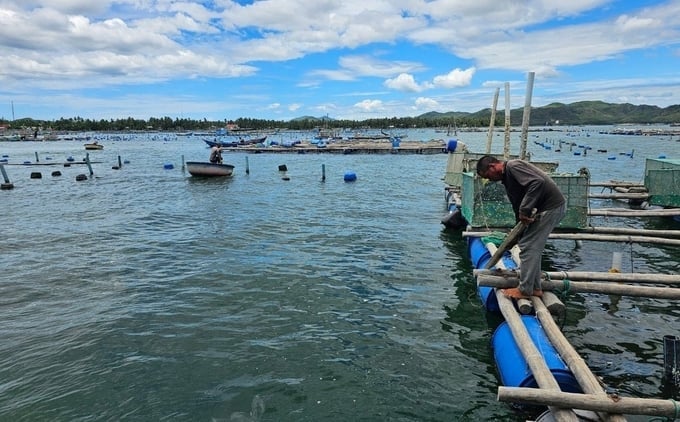
Cage aquaculture in Song Cau town, Phu Yen province. Photo: KS.
However, to date, Phu Yen province has only issued 1 certificate of cage aquaculture registration for a foreign investment project and 133 certificates for key aquaculture objects.
On the other hand, the remaining facilities have not received their certifications due to a lack of required documentation, such as land use certificates for assigned or leased land/water areas for aquaculture; aquaculture permits within the protection scope of irrigation and hydropower works; decisions on marine area assignment; leasing contracts for land/water areas to be used in aquaculture.
Consequently, the Phu Yen province's Sub-Department of Fisheries proposed the Directorate of Fisheries to issue an official document, and guide local governments in the issuance of registration documents for cage aquaculture, key aquaculture objects. Accordingly, the Directorate has been requested to support facilities which failed to meet the requirements for certificate registration due to a lack of required documentation, such as land use certificates for assigned or leased land/water areas for aquaculture; aquaculture permits within the protection scope of irrigation and hydropower works; decisions on marine area assignment; leasing contracts for land/water areas to be used in aquaculture.
In response to the proposal from Phu Yen province, Mr. Nguyen Van Huu, Deputy Head of the Department of Aquaculture under the Directorate of Fisheries, stated that cage aquaculture registration is regulated by the Government's Decree No. 26 and Decree No. 11. As a result, it is necessary to amend these documents in order to resolve challenges.
According to Mr. Huu, the Prime Minister issued Decision No. 2177 dated December 23, 2021 approving the plan to simplify regulations on business activities under the management of the Ministry of Agriculture and Rural Development, which allowed for the abolition of point b, clause 2, Article 36. So far, the Ministry of Agriculture and Rural Development has submitted amendments to Decree No. 26, including the removal of point b, clause 2, Article 36.
According to our research into cage aquaculture registration, the registration of key aquaculture objects is implemented under Article 36 of the Government's Decree No. 26. Accordingly, the provincial fisheries management authority is tasked with receiving, appraising, and issuing registration certificates for cage aquaculture, key aquaculture objects.
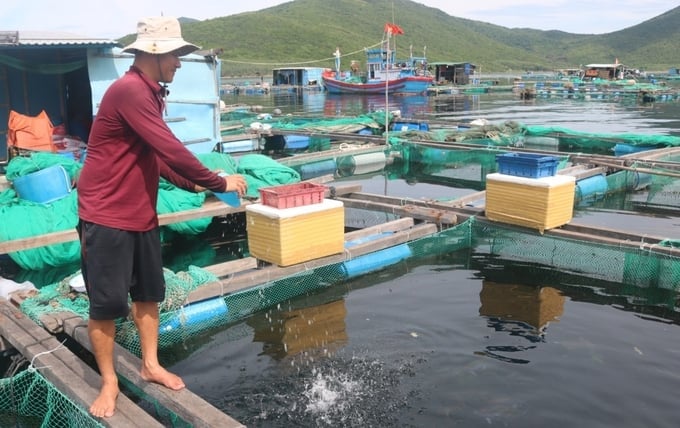
The registration of cage aquaculture and key aquaculture objects is currently carried out in accordance with Article 36 of the Government's Decree No. 26. Photo: KS.
The registration dossier includes: Application Form No. 26 under NT Appendix III of Decree No. 26; land use certificate for assigned or leased land/water areas for aquaculture, aquaculture permits within the protection scope of irrigation and hydropower works; decisions on marine area assignment; leasing contracts for land/water areas to be used in aquaculture; layout diagram of the aquaculture pond/cage with confirmation from the facility owner.
The re-registration dossier includes: Re-registration Form No. 27 under NT Appendix III of Government's Decree 26; a certified copy of the previously issued registration document (except in case of loss); in case of changes in the facility owner, supporting documents must be provided; changes in pond area or purpose of use must be accompanied by a layout diagram of the aquaculture pond/cage with confirmation from the facility owner.
The registration process for cage aquaculture and key aquaculture objects includes: The aquaculture facility owner submits the dossier to the provincial fisheries management authority. Within five working days after receiving the complete dossier, the provincial fisheries management authority reviews and issues the registration certificate according to Form No. 28 under NT Appendix III of Decree 26 dated March 8, 2019.
The re-registration for cage aquaculture and key aquaculture objects is required in the following cases: Previously issued registration document is lost or damaged; change of facility owner; change in pond area; change in aquaculture object; change in purpose of use.
Translated by Nguyen Hai Long

(VAN) Hue City rigorously enforces regulations regarding marine fishing and resource exploitation, with a particular emphasis on the monitoring of fishing vessels to prevent illegal, unreported, and unregulated (IUU) fishing.

(VAN) Hanoi People's Committee has issued a plan on reducing greenhouse gas emissions in the waste management sector with 2030 vision.

(VAN) Vietnam's draft amendment to Decree No. 156 proposes a mechanism for medicinal herb farming under forest canopies, linking economic development to population retention and the sustainable protection and development of forests.

(VAN) In reality, many craft village models combined with tourism in Son La have proven effective, bringing significant economic benefits to rural communities.

(VAN) The international conference titled Carbon Market: International experiences and recommendations for Vietnam was successfully held recently in Ho Chi Minh City.

(VAN) According to the Project on rearranging provincial and communal administrative units, in 2025, the country will have 34 provinces/cities, 3,321 communes, wards, and special zones, and no district-level organization.
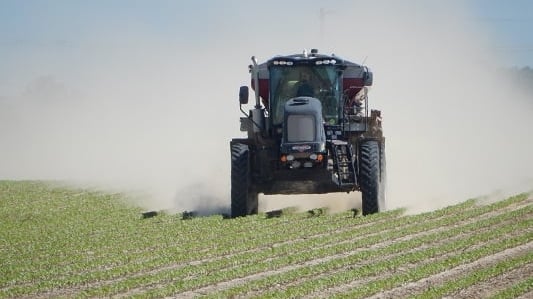
(VAN) The vice president of fertilizer with Stone X Group says the Trump administration’s tariffs are impacting fertilizer markets.